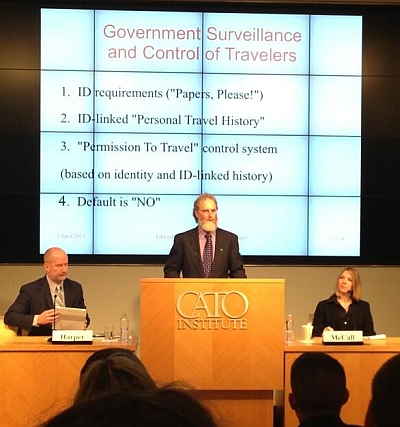What’s been most noteworthy in DHS legal arguments in “no-fly” and other related cases isn’t that the government has tried to argue in defense of intrusive and repressive surveillance and control of travel.
Instead, the consistent strategy of the DHS has been to argue (1) that it doesn’t have to give any arguments or evidence in support of these practices, because they are exempt from judicial review, and (2) that if it does have to give the courts any evidence or arguments, it can do so in secret, so that opposing parties and their lawyers are unable to know, or respond to, the government’s secret arguments and secret evidence.
Fortunately, some judges seem to be running out of patience with these claims that the executive branch of government is above the law.
We’re particularly encouraged by the latest order issued December 20, 2012 in the case of Ibrahim v. DHS, which continues to appear likely to result in the first review of a no-fly order, on its merits, by any court.
Since 2005, when she was refused boarding and detained by police when she tried to board a flight at San Francisco International Airport, Rahinah Ibrahim has been trying to find out who put her on the “no-fly” list and why, get off the “no-fly” lost, and obtain damages from the government agencies, contractors, and individuals responsible for her false arrest and the interference with her right to travel.
The city and county of San Francisco (responsible for the airport police) eventually paid Dr. Ibrahim $225,000 to settle her claims against them. But the federal government defendants have continued to try to get the case dismissed before any discovery, fact finding, or trial on the merits of Dr. Ibrahim’s claims.
The 9th Circuit Court of Appeals has twice rejected the government’s appeals of preliminary rulings allowing the case to go forward and allowing Dr. Ibrahim’s lawyers to proceed with discovery. But even after the federal defendants’ latest appeal was rejected, the government again moved the District Court to stay any discovery and dismiss the complaint.
In support of their latest motion to dismiss, the government went beyond filing evidence and legal arguments with the court “under seal” for in camera review by the judge (but not Dr. Ibrahim or her lawyers).
Instead, the government called the judge’s chambers to advise that a courier was on his way from Washington to the courthouse in San Francisco with some secret documents, which he proposed to show the judge, alone in chambers, and then take back to Washington so that there would be no record with the court, even in a “sealed” file, that would enable the court of appeals to review the basis for the judge’s decision.
Judge William Alsup of the U.S. District Court for the Northern District of California told the courier not to darken his door, and refused to look at any of the secret evidence, even in camera. Then he delivered a smackdown to the government in his ruling dismissing its motions.
Read More →
